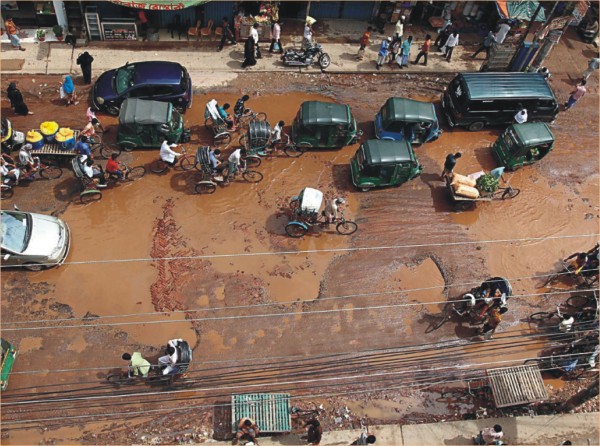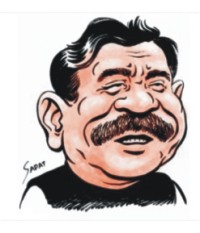
Inside
|
Road safety:
held hostage by trade unions
TAWFIQUE ALI exposes the lawlessness that reigns supreme in the transport sector due to the influence exerted by trade unions.
The overall scenario
We are destined to face fatal road accidents and lose dozens of human lives every other day in Bangladesh with the transport sector being a hostage to trade unions and corruption. It will not be an exaggeration to say that it is lawlessness and rampant corruption by private transport owners and affiliated worker unions that virtually rule the country's transport sector. Private owners own the entire sector except a scanty number of BRTC buses and trucks. It is widely reported and believed that Bangladesh Road Transport Workers Federation (BRTWF) led by the incumbent shipping minister has been a pivotal actor in enforcing anarchy in the transport sector management over the past couple of decades.
 Anurup Kanti Das
Anurup Kanti Das
The situation has appallingly worsened over time with the frequency of tragedies increasing, claiming more and more innocent lives. We were shocked each time we lost school students, children, parents, workers, top bureaucrats, farmers, filmmakers, artists and journalists in road accidents with the government playing the role of a mere silent spectator, making no tangible efforts to contain the situation except for making hollow promises.
None of the successive governments have ever undertaken the issue of preventing tragic deaths in road accidents as an agenda, as the transport sector has remained a potential source for illegal extortion by the owners' and workers' unions always backed by ruling party elements.
So, who rules the entire sector? Under the auspices of the shipping minister, errant owners, drivers and workers rule the sector. However, BRTA, traffic police and highway police are legally responsible for taking actions against errant drivers and unfit vehicles. To one's utter disappointment, the BRTA has only two mobile courts led by executive magistrates for legal actions against unlicensed driving primarily in Dhaka metropolitan city while the wayward drivers and unfit vehicles in the rest of the country enjoy almost a free rein.
Though there is a lax patrol of the highway police; with inadequate manpower and logistics, it is bribery that ultimately dictates the deal for unfit and unregistered vehicles and unlicensed drivers. In other words, lawlessness never leaves the sector thanks to a constant pressure from a powerful group of owners and workers.
Nexus between trade unions and political quarters
With the changeover of political power each time, ruling party men take over the extortion cartel assuming the tag of 'owners' and 'workers' unions. The sector insiders estimate that different unions collect at least Tk 2 crore illegally from the transport operators everyday in Dhaka metropolitan area alone. Though it happens in broad daylight, the transaction has no records.
The incumbent shipping minister Shahjahan Khan, who is executive president of BRTWF, made a shocking demand to the parliamentary sub-committee on transport sector in mid February this year that extortion in the sector be made a legal practice. On top of placing a 17-point demand, he also demanded that a totally new committee be formed to facilitate implementation of his demands. The new committee, he suggested, should include himself and Jatiya Party leader Moshiur Rahman Ranga, executive president of Bangladesh Sarak Paribahan Samity (BSPS). He however had made his most insensitive as well as callous remark last year in the face of public outcry following the tragic deaths of filmmaker Tareque Masud and journalist Mishuk Munier along with their driver and two other crews, he had said that BRTA should issue driving license only if a driver could identify a cow or a goat on the road.
The parliamentary sub-committee chaired by M Israfil Alam, after an October meeting last year, told reporters that a minister-led transport labour organisation was running an extortion-regime in the sector. It collects at least Tk 51 crore a year in the name of raising funds for workers' welfare. The committee's findings were only a tip of the iceberg. Rampamt toll collection is another basic reason for hikes in passenger transport fare and commodity price hikes sometimes 200 percent higher than usual, Israfil added.
 According to the parliamentary committee findings, more than 23 lakh workers work for over 5 lakh buses, having 7,490 workers' unions and 412 bus owners' associations. In August last year, thousands of transport workers took to the streets and blocked Dhaka-Mawa highway placing heavy buses across the roads at Gabtoli, as a magistrate punished seven errant drivers. Three of the drivers holding fake licence and the rest with no licence, were arrested and handed over to police. Enraged by the action, the agitating transport workers and owners halted traffic movement in the area for over three hours and confined the magistrate forcing him to bring down the punishment to a token fine of Tk 5 each.
According to the parliamentary committee findings, more than 23 lakh workers work for over 5 lakh buses, having 7,490 workers' unions and 412 bus owners' associations. In August last year, thousands of transport workers took to the streets and blocked Dhaka-Mawa highway placing heavy buses across the roads at Gabtoli, as a magistrate punished seven errant drivers. Three of the drivers holding fake licence and the rest with no licence, were arrested and handed over to police. Enraged by the action, the agitating transport workers and owners halted traffic movement in the area for over three hours and confined the magistrate forcing him to bring down the punishment to a token fine of Tk 5 each.
This incident clearly points to the lawlessness prevalent in the sector. Even if a government official intends to enforce law by putting lawbreakers in the dock, politically-backed trade unions thwart the move. It also explains why not a single driver responsible for a road crash has been punished yet. A culture of impunity thus has taken roots in the entire sector.
Irregularities in issuing licence
The BRTA has had so far issued over 1.5 lakh driving licenses for heavy vehicles like buses and trucks directly in the face of pressure from the transport workers' federation since 1997. Last year, Shajahan Khan reportedly requested BRTA to issue about 25,000 driving licence in the same fashion without any prior test, to people listed by his federation. As per licensing rules, one is required to have a six-year driving experience to obtain a heavy vehicle license but the above mentioned licences were issued without meeting the procedural requirement.
The High Court several months back called for all the records on how those licenses were issued and ordered BRTA to stall the renewal process of those until further order. The BRTA has so far issued a total of over 11 lakh genuine driving licences including 2.5 lakh for heavy vehicles. The total includes around one lakh smartcard machine-readable licence introduced last November.
Ineffective road safety council
The National Road Safety Council, which is headed by the communications minister and has representatives of 24 government agencies, is supposed to prevent road mishaps. It has sat four times during the incumbent government's tenure though it is supposed to meet every three months. The council, formed in1995, has virtually remained ineffective. However, the council has been successful in expediting formation of highway police and an accident research institute at BUET.
The council is an inter-ministerial body with representations of home ministry, traffic police, transport sector, experts, eminent activists with the mandate to make decisions and policies on preventing road fatalities. Deputy Commissioner at district level and UNO at Upazila level lead the road safety council. Communications Minister Obaidul Quader expressed frustration over implementation of the council's decisions taken years ago, while presiding over the council's 21st meeting on June 17. The council's decisions included putting an end to plying of unfit vehicles and issuance of fake driving licence, renewal of licence regularly, creating a road maintenance fund, enhancing the capacity of road safety unit and stopping robberies on highways.
What should be done to salvage the sector
The government must first deal heavy-handedly with the extortionists to break the nexus of corrupt cartels and thus salvage the transport sector from anarchy and lawlessness. It requires honest political commitment. Citizens' movement could make it a public issue and an agenda during general election. The contending political parties may be pressed for making election pledge on the issue.
The designated functionaries, the regulatory body BRTA and police must be purged of raging corruption. The safety issue must be addressed with recommendations from relevant experts at the designing and planning stages of the roads and highways. Authorities must stop the practice of calling them only after a tragedy occurs. A public sector that crucially determines people's daily life and economy cannot be run by mere private business operators and owners.
The government has to be accountable to people for each avoidable death in road accident. Therefore, it must ensure an effective national road safety council with the authority to act against any agency working with it. The council should not remain toothless.
Strengthening BRTA with manpower and logistics, simplifying fees deposit system and modernising licensing process and also modernising traffic and highway police are vitally conducive to proper licencing and curbing corruption.
Finally, there is no alternative to well-trained, educated drivers. So, producing adequate number of qualified drivers is also important. Raising public awareness with massive publicity particularly in electronic media and incorporation of lessons in the curriculum are equally vital.
Tawfique Ali is Senior Staff Reporter, The Daily Star.